This year in retrospect.
By Assertive Way
Key Takeaways
- Hard times are not fun, but they can lead to learning, growth, and strength through reflection.
- To reflect on your year, consider your accomplishments, moments, experiences, feelings, interactions, character, behaviors, obstacles, challenges, mistakes, senses, speaking up, regrets, opportunities, and what you want more or less of.
- Write down your top learnings from 2020.
Sign up for our Weekly Newsletter “Nice With Limits” for tips and inspiration for confidence at work and to boost your career!
We take your email seriously and will never sell or share it.
Reflect on your year.
2020 was not an ordinary year. It was a year of global turmoil, uncertainty, fear, isolation, difficulty, and loss for many.
Hard times are not fun, but they can lead to learning, growth, and strength through reflection.
When you reflect at the end of the year, you:
- Learn about yourself and develop more self-awareness
- Realize how much you have gone through
- Honor that year with its good and bad
- Process a lot of information
- Get closure & remember more later
- Feel good about yourself
- Course correct for the following year
- Develop your critical thinking skills
How to reflect on your year.
Did you learn something about yourself, about someone else, about the world? Write down your top learnings from this year. Then share some of your learnings in the comments below!
Here’s a few questions to help you reflect on your year. As you answer these questions, consider the good and the bad. Consider your career, personal relationships, finances, spiritual, and health and fitness.
- Accomplishments – What are you proud of this year? What were your accomplishments? What did you do that allowed you to have those accomplishments?
- Moments – What were the major moments or surprises that happened this year that impacted you or changed your life and routine? What were the most joyful moments? Saddest moments? Most energizing moments? Hopeful moments? Aha moments?
- Experiences – What experiences did you have this year? Any adventures? What did they teach you?
- Feelings – What were emotional moments you had of both joy and sorrow, courage and fear, fun and boredom? How did you feel and why?
- Interactions – What were some of the most memorable interactions you’ve had with other people this year? Whom did you interact with? How did you interact? Why did you interact? Why was it memorable? Did you meet new people?
- Character – How would you describe your character this year? Were you kind, generous, assertive or were you negative, judgmental, and selfish? Why so? What character would make you proud of yourself?
- Behaviors – What behaviors did you show this year at work, with your family and friends, in your solo time? Are you proud of those behaviors?
- Obstacles – What challenges did you meet and how did you handle them? How did others handle the same obstacles?
- Mistakes – What mistakes did you make this year? What did you learn from those mistakes?
- Senses – What did you hear, read, watch, see, smell, taste that made you think? It could be from a book, music, film, show, conversation, conference, training, object, food, or other?
- Speaking up – When did you speak up for yourself or for others? When did you not speak up? Why so?
- Habits – What habits did you incorporate this year? What habits did you let go of? How did it change your life or how you feel?
- Regrets – Do you have any regrets?
- Opportunities – What opportunities showed up in your life? Did you embrace them? Did you miss them?
- More of and less of – What would you have wanted more of and less of this year?
Take a moment to be grateful for these learnings in your life.
Hard times are not fun, but they can lead to learning, growth, and strength through reflection.
Here are my top 10 learnings in 2020.
1. Activate your courage early.
Reserve the start of the day for your biggest act of courage, be it reaching out to someone, asking for something, or sharing your opinion about a topic.
Take courageous initiative early in the day, week, meeting, project, job, career, and conference. When you act with courage despite fear early on, you associate your identity with that courage.
2. Leaders stand up for good values during controversial, difficult, and uncertain times.
As COVID-19, economic turmoil, unemployment, racial discussions, social distancing, and much more unfolded this year, some leaders realized their mission, did more, and spoke up more. They shared their principles, encouraging messages, and took a stand knowing there would be some backlash.
In challenging times, lean in and lead with positive values and principles.
3. You can’t prevent a fire that is already burning.
Planning ahead of crisis is key because you won’t have much time to think and handle the situation when it arises, be it an earthquake, fire, hurricane, robbery, being fired, heart attack, stroke, COVID-19, or difficult conversation.
4. The best way to tackle conflict is to use curiosity and acknowledgement.
Whenever in conflict, with fear of backlash from others, of speaking up, of saying the wrong things, or of hurting feelings, activate your curiosity but don’t shy away from uncomfortable conversations.
5. Learning without implementation is just amusement.
Consider how you will use the information you learn in a course, event, or book. Plan to implement what you learned even if in a minor way.
6. You have more wisdom than you give yourself credit for.
If you aren’t used to sharing your thoughts, ideas, and perspectives in conversations, online, in meetings, or in events, then I invite you to start doing so. You’ll be amazed with the gold you find inside your brain and soul.
7. Dreaming increases focus a little. Doing increases focus a lot.
If you want to be more focused and productive then get more outputs completed. It will boost your energy and make you want to keep the momentum going.
8. Don’t side with positions, side with people.
In negotiation training, you learn to avoid positions and to focus on interests.
One way to see beyond positions is to expand your network to include a more diverse set of people. Talk to them, ask about what matters to them, and get to know them as people.
9. For people-pleasers, the quickest path to confidence is courage to speak up.
If you are a people-pleaser or a nice person, you are always thinking about negative “what if” scenarios, like what if they get upset at you, don’t like you, and think you are stupid.
Overcome “what if” by doing what you fear the most with courage and seeing what happens.
Start experimenting new behaviors, and you will soon discover how your belief and assumptions are wrong. That will build your confidence.
10. Ged free joy with a hygge routine.
Denmark is known as the world’s happiest country despite having long, dark, and cold winters. Part of their secret is in “hygge” a lifestyle that brought joy, conviviality, and coziness to their life.
The classical hygge example is the ritual of sitting by the fireplace, with hot tea, hot chocolate, or mulled wine, candles, soft music, comfortable clothing, soft blanket, warm food, a book, and good company.
It’s your turn.
Write down your top learnings from 2020!
Sign up for our Weekly Newsletter “Nice With Limits” for tips and inspiration for confidence at work and to boost your career!
We take your email seriously and will never sell or share it.
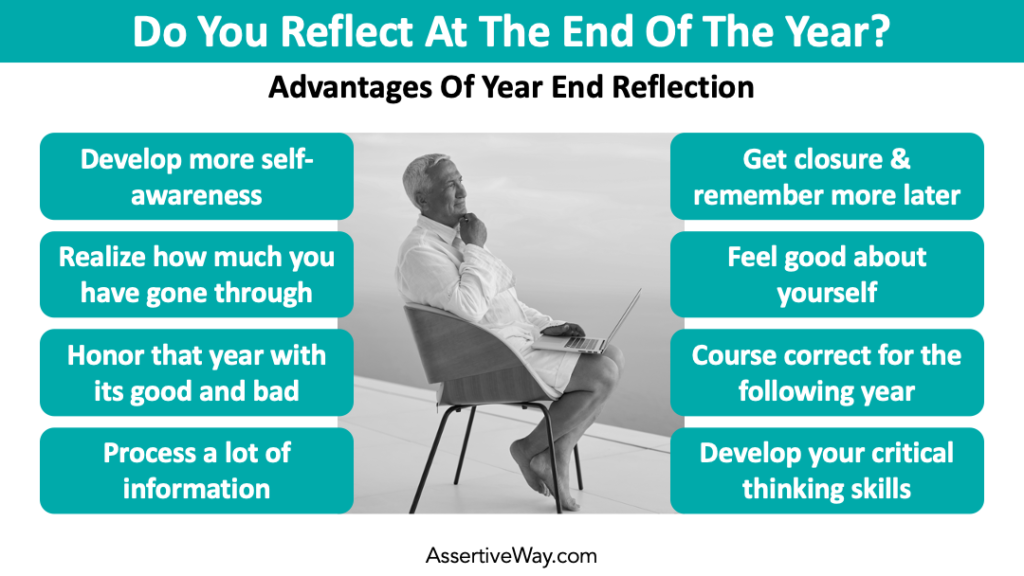
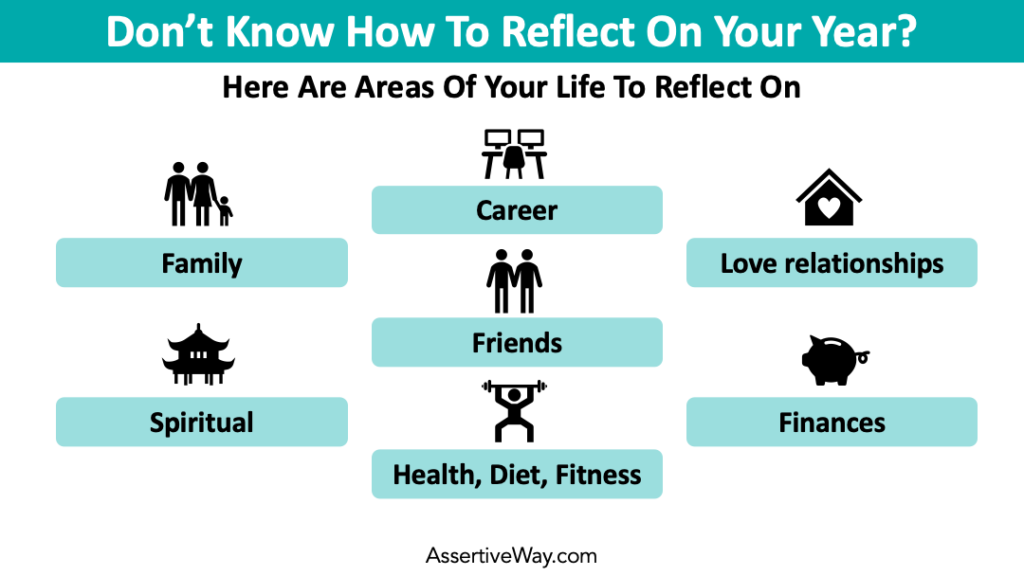
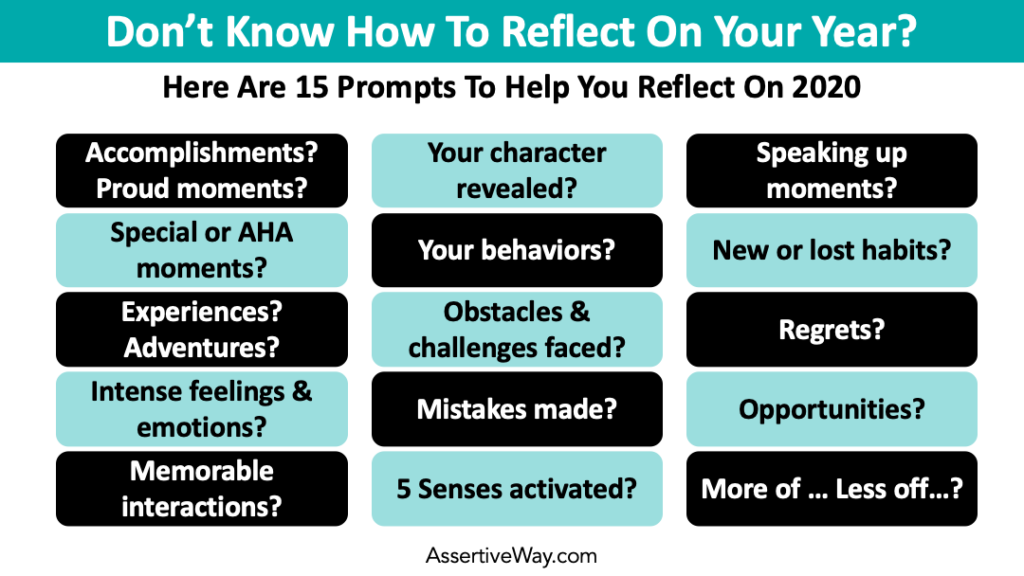
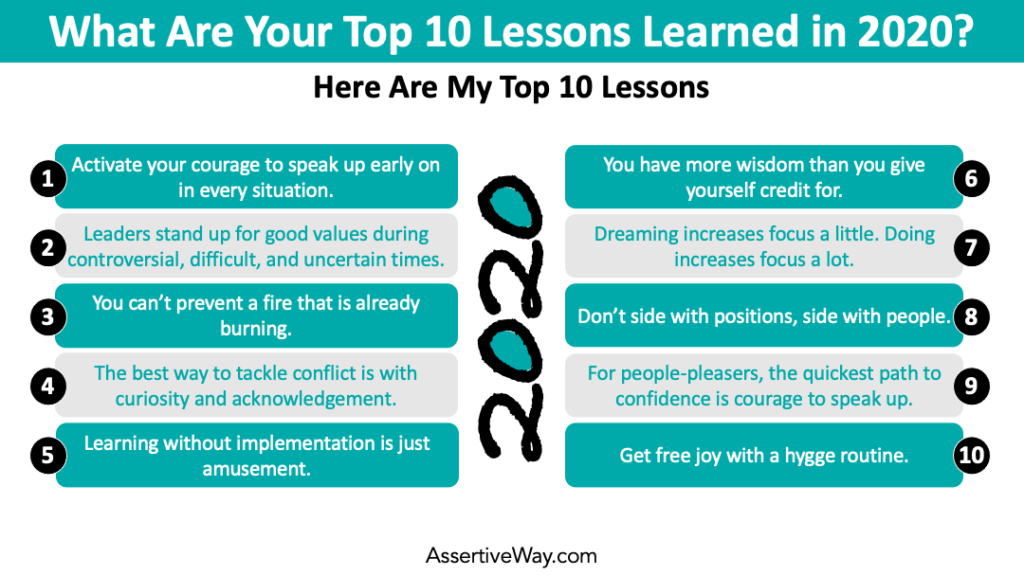
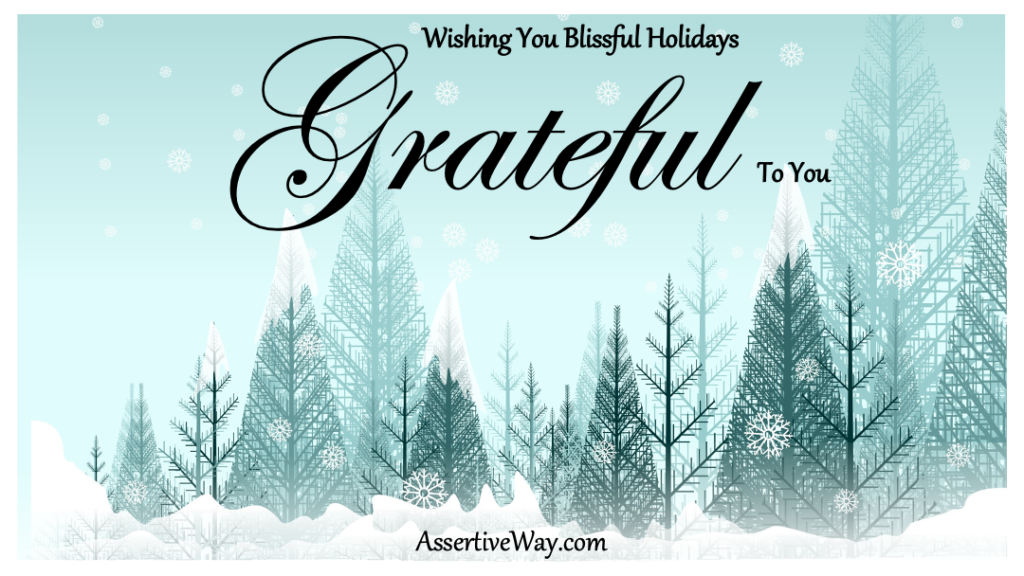
Summary
2020 was not an ordinary year. It was a year of global turmoil, uncertainty, fear, isolation, difficulty, and loss for many. Hard times are not fun, but they can lead to learning, growth, and strength through reflection.
Reflect on your year with these 15 questions. Consider the good and the bad, your career, personal relationships, finances, health, fitness, and spiritual sides.
- Accomplishments & proud moments?
- Surprising, sad, joyful, energizing, hopeful, aha moments?
- Experiences and adventures?
- Intense feelings and emotions?
- Memorable interactions?
- Your character?
- Your behaviors?
- Obstacles faced?
- Mistakes made?
- Senses activated?
- Speaking up moments?
- New or lost habits?
- Regrets?
- Opportunities seized or not?
- More of and less of …?
Here are my top 10 learnings in 2020.
- Activate your courage early.
- Leaders stand up for good values during controversial, difficult, and uncertain times.
- You can’t prevent a fire that is already burning.
- The best way to tackle conflict is to use curiosity and acknowledgement.
- Learning without implementation is just amusement.
- You have more wisdom then you give yourself credit for.
- Dreaming increases focus a little. Doing increases focus a lot.
- Don’t side with positions, side with people.
- For people-pleasers, the quickest path to confidence is courage to speak up.
- Add a hygge routine to your day.
“Year’s end is neither an end nor a beginning but a going on, with all the wisdom that experience can instill in us.” – Hal Borland
Spread the assertive confidence!
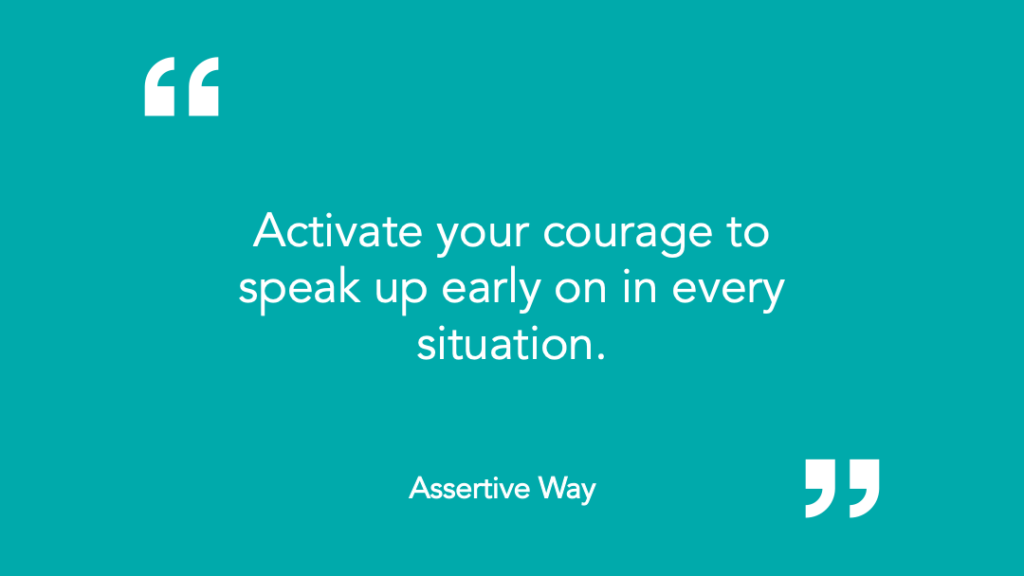
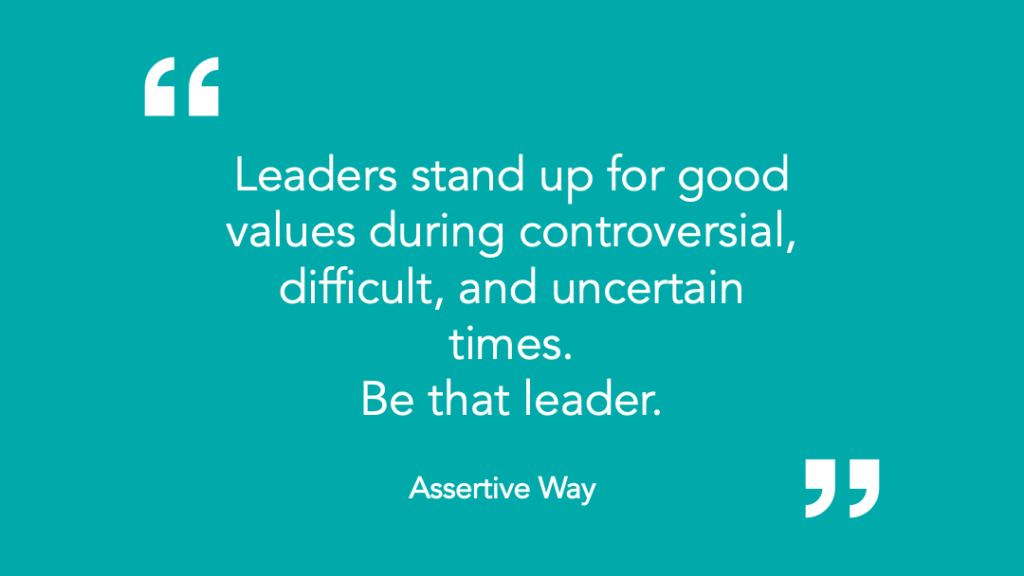
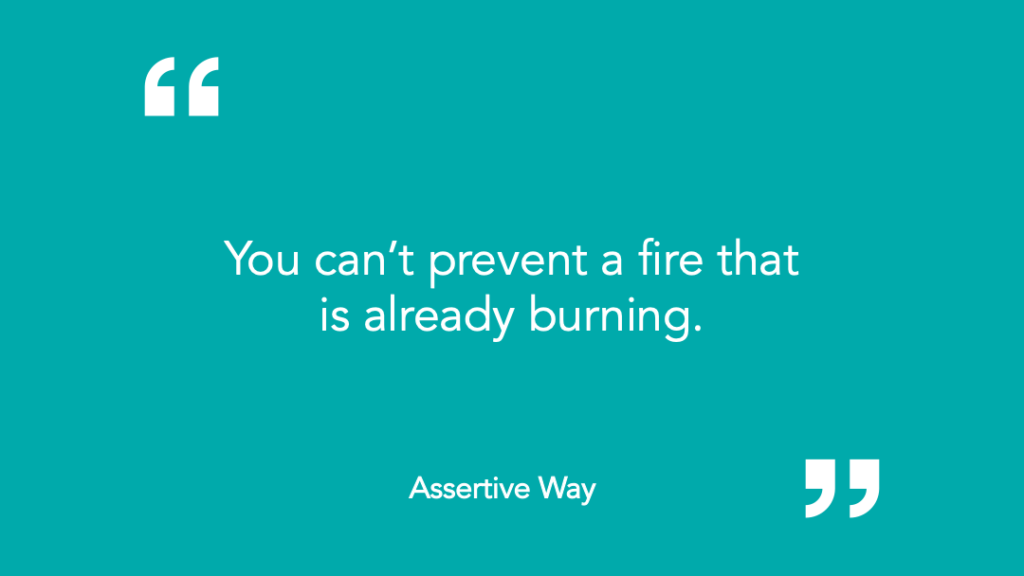
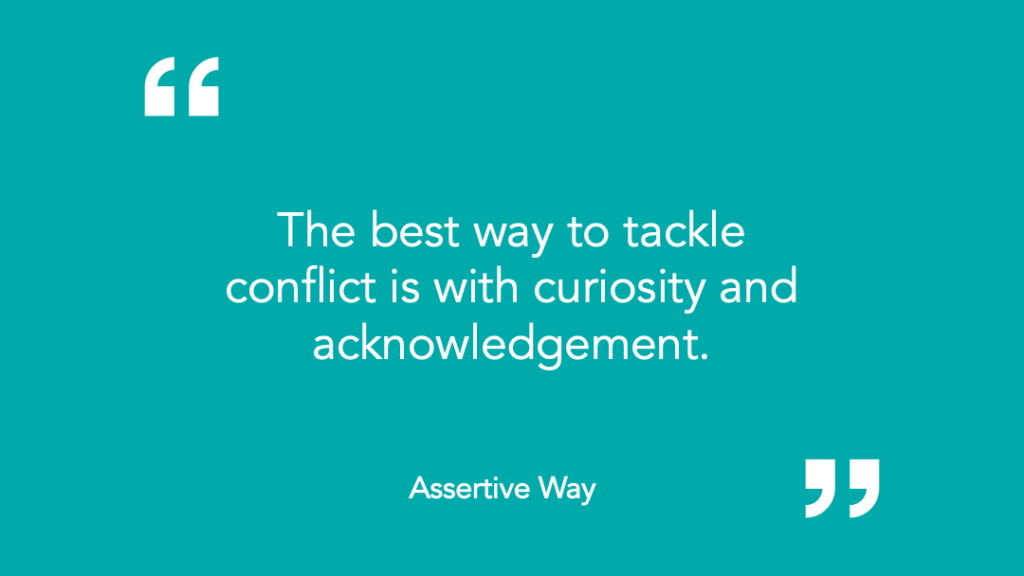
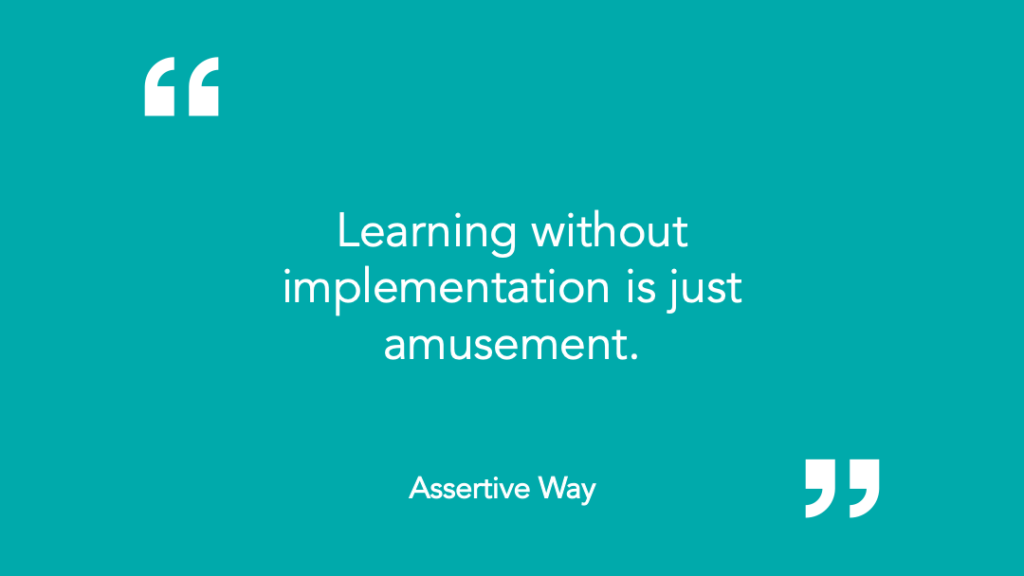
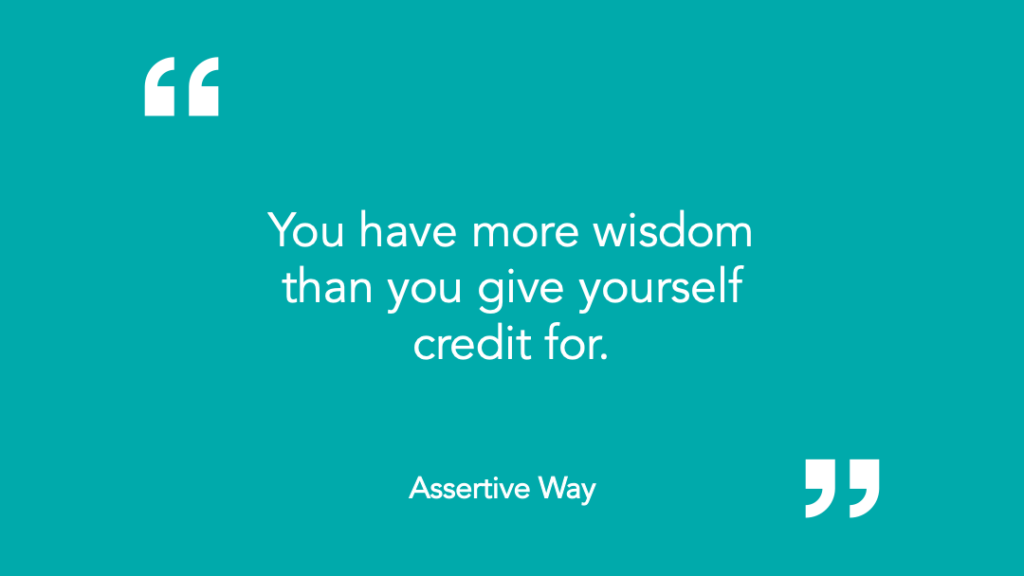
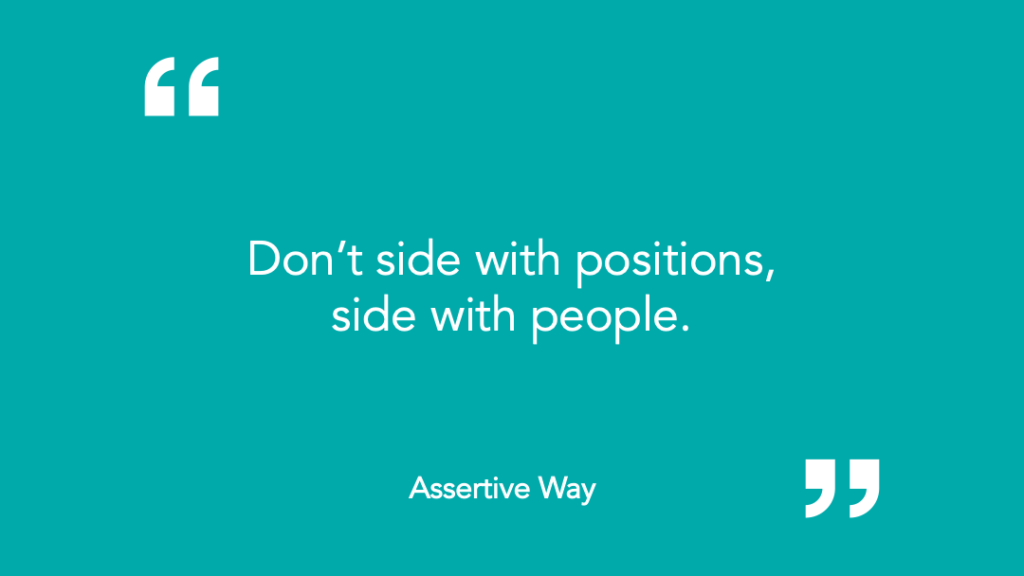
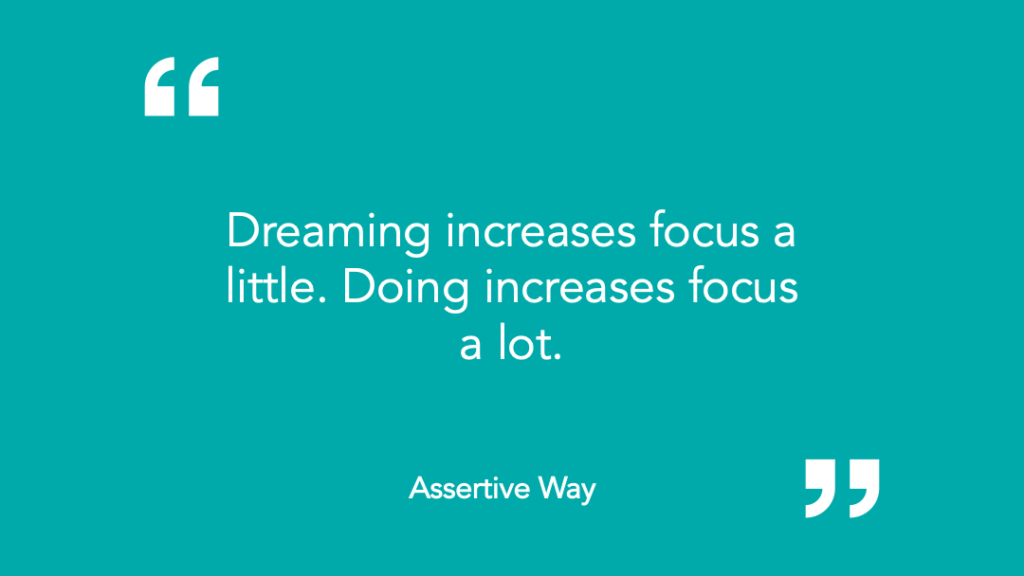
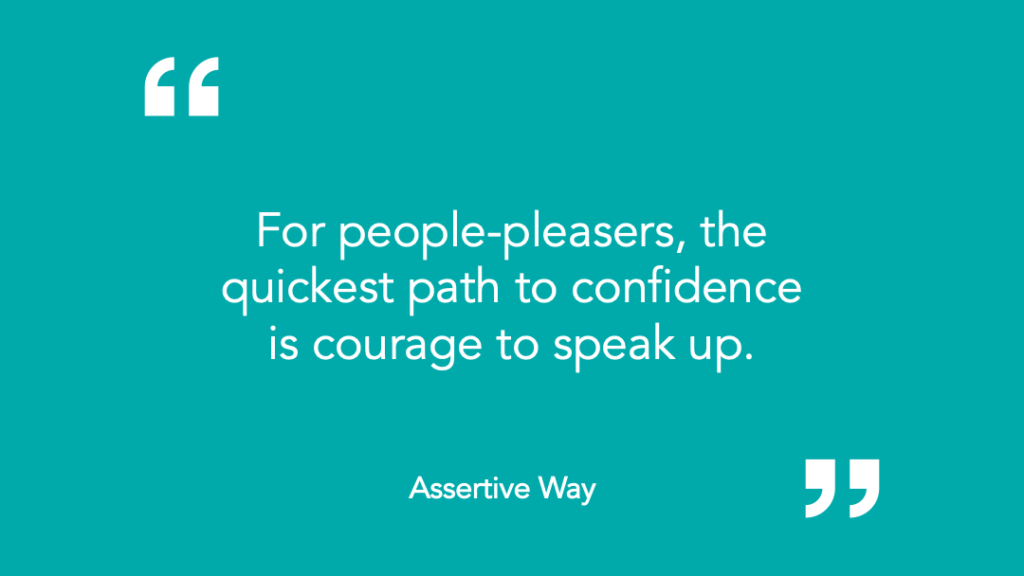
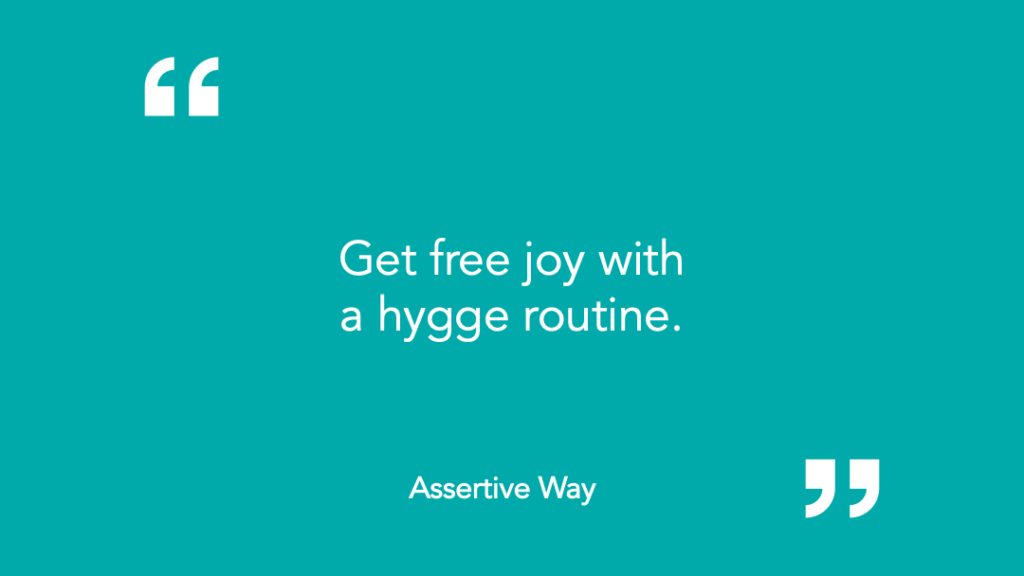
Recent Posts
Video Transcript
In this video I’ll share 15 questions to help you reflect on your own year and I’ll share my top 10 learnings this year.
2020 was not an ordinary year. It was a year of global turmoil, uncertainty, fear, isolation, difficulty, and loss for many. Luckily, I’ve been fortunate to be safe, healthy, and well and to know that my family is also safe.
Hard times are not fun, but they can lead to learning, growth, and strength through reflection.
When you reflect at the end of the year, you:
- Learn about yourself and develop more self-awareness
- Realize how much you have gone through
- Honor that year with its good and bad
- Process a lot of information
- Get closure & remember more later
- Feel good about yourself
- Course correct for the following year
- Develop your critical thinking skills
Did you learn something about yourself, about someone else, about the world? Write down your top learnings from this year. Then share some of your learnings in the comments below!
Here’s a few questions to help you reflect on your year. As you answer these questions, consider the good and the bad. Consider your career, personal relationships, finances, spiritual, and health and fitness.
- Accomplishments – What are you proud of this year? What were your accomplishments? What did you do that allowed you to have those accomplishments?
- Moments – What were the major moments or surprises that happened this year that impacted you or changed your life and routine? What were the most joyful moments? Saddest moments? Most energizing moments? Hopeful moments? Aha moments?
- Experiences – What experiences did you have this year? Any adventures? What did they teach you?
- Feelings – What were emotional moments you had of both joy and sorrow, courage and fear, fun and boredom? How did you feel and why?
- Interactions – What were some of the most memorable interactions you’ve had with other people this year? Whom did you interact with? How did you interact? Why did you interact? Why was it memorable? Did you meet new people?
- Character – How would you describe your character this year? Were you kind, generous, assertive or were you negative, judgmental, and selfish? Why so? What character would make you proud of yourself?
- Behaviors – What behaviors did you show this year at work, with your family and friends, in your solo time? Are you proud of those behaviors?
- Obstacles – What challenges did you meet and how did you handle them? How did others handle the same obstacles?
- Mistakes – What mistakes did you make this year? What did you learn from those mistakes?
- Senses – What did you hear, read, watch, see, smell, taste that made you think? It could be from a book, music, film, show, conversation, conference, training, object, food, or other?
- Speaking up – When did you speak up for yourself or for others? When did you not speak up? Why so?
- Habits – What habits did you incorporate this year? What habits did you let go of? How did it change your life or how you feel?
- Regrets – Do you have any regrets?
- Opportunities – What opportunities showed up in your life? Did you embrace them? Did you miss them?
- More of and less of – What would you have wanted more of and less of this year?
Take a moment to be grateful for these learnings in your life.
Here are my top 10 learnings in 2020.
Activate your courage early.
This year I learned that my courage peaks in the early morning, before I have time to think about why I shouldn’t do or say what I want, before I have time to get busy, and before I have time to get distracted. When I don’t focus on my act of courage first thing in the morning, I procrastinate.
The same way you’d reserve the start of the day for the most important or difficult tasks, make sure you reserve the start of the day for your biggest act of courage, be it reaching out to someone, asking for something, or sharing your opinion about a topic.
Take courageous initiative early in the day, early in the week, early in the meeting, early in the project, early in the job, early in your career, early in the conference. When you act with courage despite fear early on, you build that muscle and you start to associate your identity with that courage.
Leaders stand up for good values during controversial, difficult, and uncertain times.
As COVID-19, economic turmoil, unemployment, racial discussions, social distancing, and much more unfolded this year, I saw many leaders rise to the challenges and speak up even more. Those were the leaders I grew fonder of. They shared their principles, message, and they took a stand knowing there would be backlash.
Through their actions I realized the leader I want to be. I want to speak up during crisis. I want to share positive messages that challenge people to own their choices, especially during hard times. I want to voice my ideas so that someone can benefit from it. That is why this year I decided I will also share my principles and values in my content because I want to lead with values, not just knowledge.
In challenging times, lead with positive values and principles.
You can’t prevent a fire that is already burning.
This year I experienced the first earthquake that made me fearful. It was a 4.5 magnitude earthquake that happened at 11:38pm in Southern California. No major damage happened in California, however it instilled enough fear to motivate me to finally get my act together and plan for natural disasters. When it happened, I ran around the house and then settled under the living room table, which was not the right thing to do.
After I studied what we should have done, I realized I did not respond in an adequate way. I panicked, didn’t know what to do, and didn’t have the supplies I needed if there was a power cut and if the building fell down. I made a list of supplies and bought what I needed. I planned on best safety positions in every room of the house. I planned on how to communicate with others.
I also got a notice for fire evacuation for the first time this year, which I also planned for.
Planning ahead of crisis is key because you won’t have much time to think and handle the situation when it arises, be it an earthquake, fire, hurricane, robbery, being fired, heart attack, stroke, COVID-19, difficult conversation, and so on.
It’s uncomfortable to think about these things, but when planned ahead of time, it makes things easier. For physical danger, have a safety plan. For situational psychological or emotional crisis, have a list of principles and an action plan. Know whom to call for help. Know what is important.
The best way to tackle conflict is to use curiosity and acknowledgement.
The killing of the African-American George Floyd this year unleashed protests, discussions, and a national movement around “Black Lives Matter.”
All my life I’ve had many black friends and I consider myself very unbiased and inclusive. My first reaction to it all was to prove that I wasn’t racist to my African-American friends, which I later realized was a selfish reaction. I felt uncomfortable speaking about the problem because I feared I would hurt other people’s feelings no matter what I said. I was scared to post about it on social media even though I felt I must. I didn’t know what to say. I was too focused on problem solving. I also realized I misunderstood the problem with “All Lives Matter.”
As I thought about how to engage in the Black Lives Matter movement, I turned to curiosity, listening, empathy, and I learned how important acknowledgment was. The widespread prejudice was not going to dissipate or go away, but African-Americans wanted others to acknowledge their real struggle.
Whenever in conflict, whenever in fear of backlash from others, whenever in fear of speaking up, whenever in fear of saying the wrong things, whenever in fear of hurting feelings, activate your curiosity but don’t shy away from uncomfortable conversations.
Learning without implementation is just amusement.
I always loved attending conferences, and this year I was fortunate to attend several online conferences and events. I showed up fully, I took part in discussions, I took notes, and I even created an action list of things I wanted to implement. However, as soon as the event ended, I was back to my normal life. If I didn’t implement the learnings fast enough, it disappeared in my memory and never got implemented.
I felt like I enjoyed these events but wasted precious time because I consumed information but didn’t take any action. I intended to act, but following through was such a large project in itself that I was never ready to start.
So, I decided to adopt a different strategy. After a conference or reading a book, I planned some mini-actions that I could implement in just a few hours but that would give me some progress. Those mini-actions reinforced the learning, and helped me start moving forward.
Consider how you will use the information you learn in a course, event, or book. Plan to implement what you learned even if in a minor way.
You have more wisdom then you give yourself credit for.
I’ve always struggled with impostor syndrome. Sometimes I feel like what I have to say is not worthwhile other people’s time. Sometimes I feel like I don’t have anything meaningful to share.
This year, for the first time in my life, I started to regularly publish content to the world through articles, videos, and infographics. As I prepared content, like this one, I discovered that there was a lot more wisdom inside of me than I thought there was. I realized I had stories, experiences, perspectives that were unique and valuable.
If you aren’t used to sharing your thoughts, ideas, and perspectives in conversations, online, in meetings, or in events, then I invite you to start doing so. You’ll be amazed with the gold you find inside your brain and soul.
Dreaming increases focus a little. Doing increases focus a lot.
Last year I wrote a 200-page business plan for AssertiveWay.com, did a lot of research and a lot of planning. I was excited and energized with the prospect of the business, but I was very distracted and found it hard to keep focused.
This year I’ve continued to try to be more focused and productive. I learned that the more real work I did, the more I built, wrote, and shared, the more focused I became. I learned that action-taking increases my focus more than any planning, visualizing, or studying does.
If you want to be more focused and productive then get more outputs completed. It will boost your energy and make you want to keep the momentum going.
Don’t side with positions, side with people.
As I watched all the political action happen this year in the US, I noticed how many people strongly connect to one of the two main political parties, not the political leaders and their intent. I also noticed many people judge others based on the political party they support. There is fear, hatred, and a focus on the differences.
I wish people could see people, not political parties, not race, not income level, not nationality, not professions, not sexual orientation, not gender, not religion, not age. Let’s bring back the humanity in people.
In negotiation training, you learn to avoid positions and to focus on interests. This year I saw a lot of positions loaded with judgement and anger.
One way to see beyond positions is to expand your network to include a more diverse set of people. People from diverse cultures, cities, ages, genders, political views, ethnicities, countries, income level, profession, etc. Talk to them, ask about what matters to them, and get to know them as people.
For people-pleasers, the quickest path to confidence is courage to speak up.
If you are a people-pleaser or a nice person, you are always thinking about negative “what if” scenarios, like what if they get upset at you, what if they don’t like you, and what if they think you are stupid. These “what if’s” are deep in your belief system and are based on fear.
The best way to overcome them is to prove them wrong by doing what you fear the most and seeing what happens. That is why you must cultivate courage. Courage to be yourself, courage to speak up, courage to let others be upset, and specifically to be upset with you.
With courage you will start experimenting new behaviors, and you will soon discover how your belief and assumptions are wrong. You will notice positive outcomes that will change your belief system and build your confidence.
Add a hygge routine to your day for free joy.
In January, as I and a couple headed for a wine tasting in Napa Valley for a birthday celebration in a cold crisp evening, these friends introduced me to the word hygge. I looked it up and since have been a fan of this Danish and Norwegian lifestyle term. I’ve incorporated hygge into my morning, evening, and weekend routines, and I feel wonderful.
Denmark is known as the world’s happiest country despite having long, dark, and cold winters which often leads to sadness and depression. To better cope with the long dark winters they created a whole way of life that brought joy, conviviality, and coziness to their days and nights.
You can practice Hygge alone, with a small group of people, during the day or night, at home, at work, or in nature. It is a practice of slowing down and enjoying the simple things in life.
The classical hygge example is the ritual of sitting by the fireplace in a cold night, with a hot cup of aromatic tea, hot chocolate or mulled wine, candle light in a dim room and soft music, with comfy clothing, covered with a soft blanket, eating a warm soup, reading a book, spending time with 1, 2, or 3 more people, or calling a loved one. Another way to enjoy hygge is to spend quiet time enjoying nature.
During times of social distancing, constant negativity in the news, and disconnection where you may not be able to go to restaurants, events, or holiday parties, it is important to learn to enjoy life in new ways like the Danish.
Hygge is social distancing friendly and holiday compatible. Try it out and invite someone you love to do the same.
Write down your top learnings from this year. Share one of your learnings below.

What are your lessons this year so far? I’d love to hear at least one!
I reckon something truly special in this website.
Thanks I appreciate your kind words!
Some really great info, Gladiola I detected this. I’m not spaming. I’m just saying your website is AWSOME! Thank you so much! Please vist also my website.
Thank you so much for your lovely comment! I really appreciate it. I see you are I the auto space. I wish you a lot of luck with it!!
Really nice design and good subject material. Please also check my website. I love cars!
Thanks for your kind comment! I does seem that you love cars! Its awesome that you were able to make a cool website with what you love.